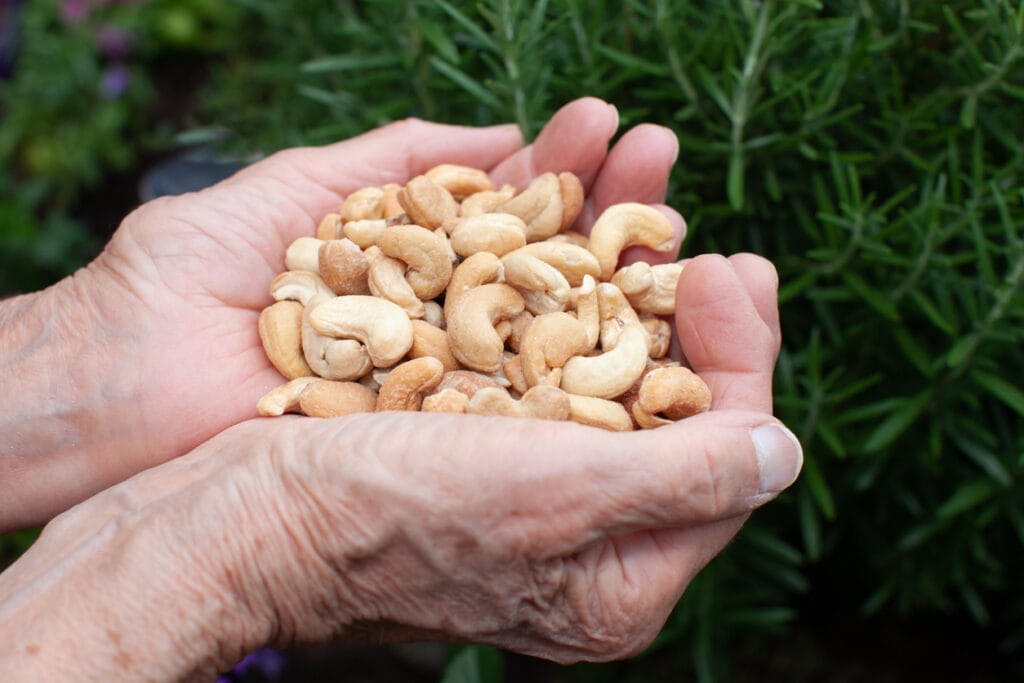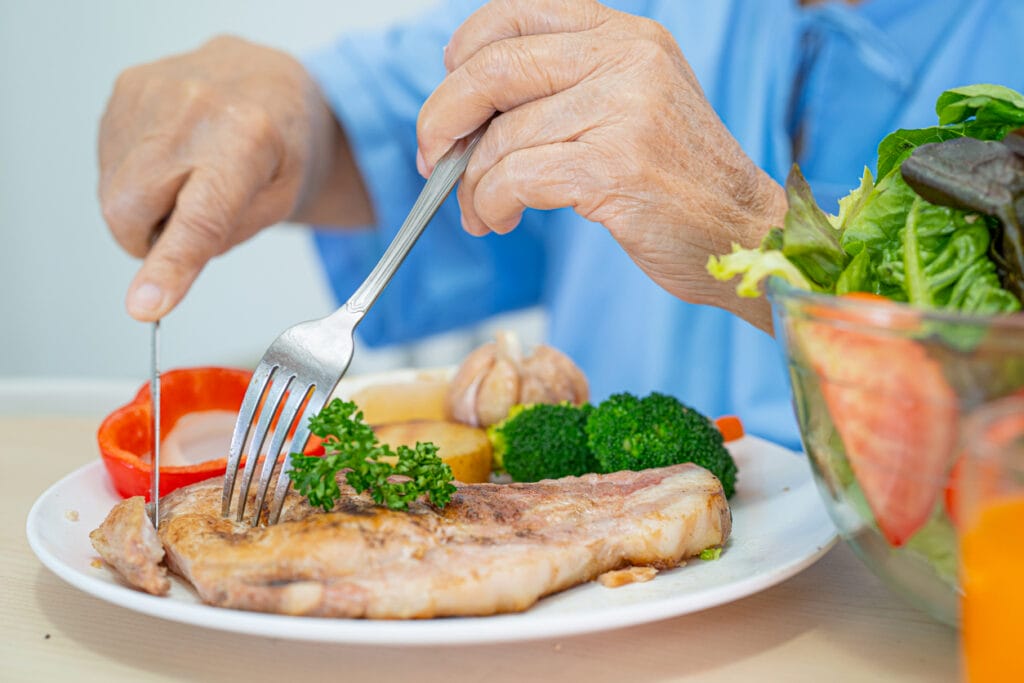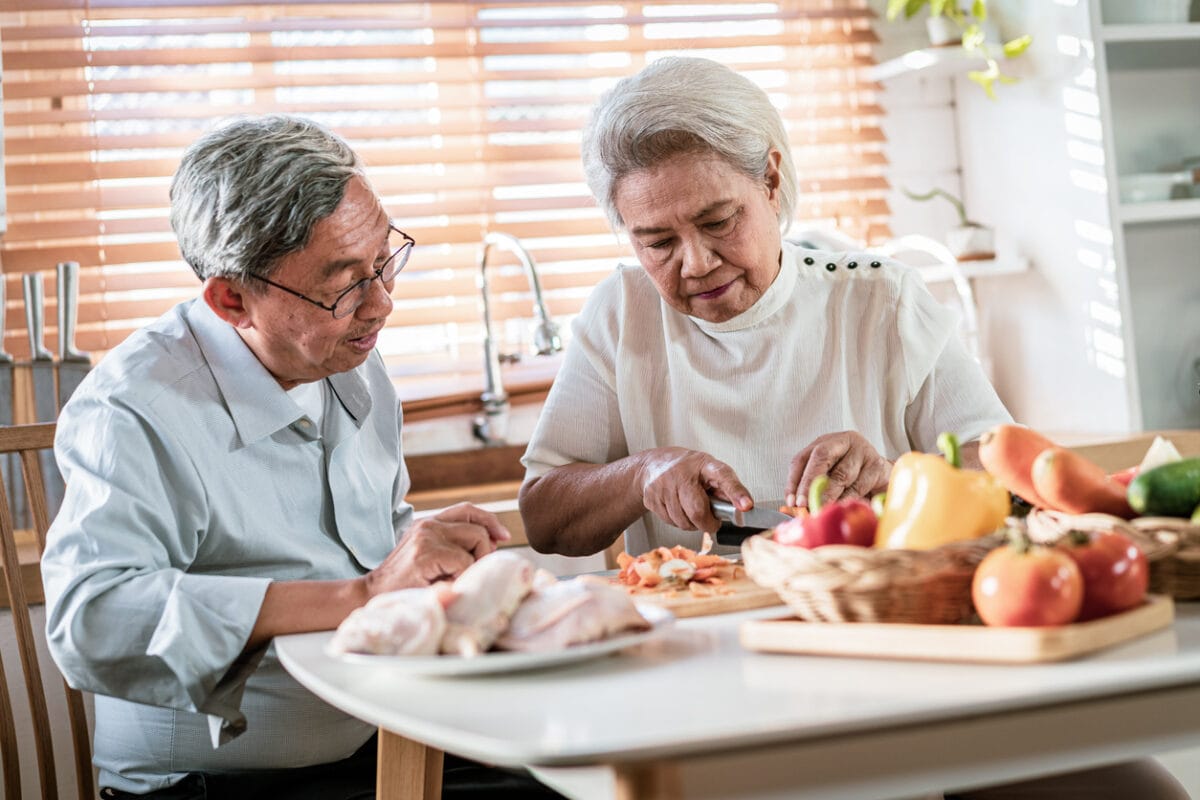Protein for seniors serves as the building block for cells, tissues, and muscles, contributing significantly to various vital functions. It not only aids in maintaining muscle mass but also plays a pivotal role in bolstering the immune response and sustaining overall health.
Aging affects our senior loved ones’ ability to process protein. Muscle mass, a protein reservoir, naturally shrinks by 3-8% per decade after age 30, according to the Journal of Applied Physiology study. This, along with metabolic changes and reduced nutrient absorption, weakens protein synthesis, and the building of new proteins.
Older adults might also need more protein to trigger the same muscle-building response as younger people, as indicated by the American Journal of Clinical Nutrition study.
To compensate, experts recommend 1.0-1.2 grams of protein per kilogram of body weight daily for older adults, exceeding the standard 0.8 grams/kg/day for younger individuals, according to the European Society for Clinical Nutrition and Metabolism – ESPEN.

Potential Health Impacts
Ensuring adequate protein intake among seniors is crucial for their health and well-being. Below are some potential health impacts associated with both inadequate and excessive protein consumption:
- Inadequate protein consumption can lead to muscle wasting, resulting in weakness and reduced mobility.
- Insufficient protein intake may compromise immune function, leaving seniors more susceptible to infections and illnesses.
- Delayed wound healing is a potential consequence of inadequate protein intake, increasing the risk of complications from injuries or surgeries.
- Conversely, excessive protein intake may strain the kidneys and lead to metabolic imbalances, posing health risks for seniors with pre-existing conditions such as kidney disease.
Determining Protein Requirements
Key Influencing Factors
When determining protein requirements, it’s important to consider several key influencing factors:
- Health status: Seniors with certain health conditions may require more protein to support healing and recovery, while those managing chronic illnesses may have specific dietary considerations that affect their protein needs.
- Physical activity levels: The level of physical activity can impact protein requirements, with more active individuals generally needing higher protein intake to maintain muscle mass and strength.
- Metabolic rate: Variations in metabolic rate among seniors can affect how efficiently their bodies utilize protein, influencing the amount needed to support metabolic processes and overall health.
Estimating Adequate Intake
Guidelines exist to help estimate appropriate protein intake based on individual circumstances. Generally, it’s recommended that seniors aim for a daily protein intake of 1.0-1.2 grams per kilogram of body weight. However, this may vary depending on factors such as muscle mass, health status, and dietary preferences. Consulting with a registered dietitian or healthcare provider can provide personalized recommendations tailored to your loved one’s specific needs.
Seeking professional guidance is crucial for developing a personalized dietary plan that meets your loved one’s protein requirements. Registered dietitians can assess nutritional needs, address any concerns or limitations, and provide practical strategies for increasing protein intake through dietary adjustments or supplementation. Healthcare professionals can also monitor progress and make adjustments as needed to ensure optimal nutrition and overall well-being.
Optimal Protein Sources for Seniors
Ensuring that our elderly loved ones have access to high-quality protein sources is essential for their health and well-being. Here’s how we can navigate the process:
Diverse Protein Options
Seniors can benefit from a variety of protein-rich foods that provide essential nutrients to support their health. Some high-quality protein sources suitable for seniors include:
- Lean meats: Such as chicken, turkey, and lean cuts of beef or pork.
- Fish and seafood: Rich in omega-3 fatty acids and easily digestible protein.
- Eggs: A versatile and nutrient-dense protein option.
- Dairy products: Including milk, yogurt, and cheese, which provide calcium along with protein.
- Legumes: Such as beans, lentils, and chickpeas, which are high in protein and fiber.
- Nuts and seeds: Like almonds, walnuts, chia seeds, and flaxseeds, which offer protein, healthy fats, and other essential nutrients.

Diet Integration Strategies
Integrating adequate protein sources into everyday meals can be achieved through practical strategies such as:
- Including protein-rich foods in each meal and snack: Incorporate a variety of protein sources throughout the day to ensure balanced nutrition.
- Adding protein to existing dishes: Boost the protein content of soups, salads, and casseroles by adding ingredients like beans, tofu, or diced chicken.
- Using protein supplements when necessary: In cases where dietary protein intake is inadequate, protein supplements such as shakes or bars recommended by a healthcare professional can help bridge the gap.
Practical Meal Planning
Meal planning plays a crucial role in ensuring that our elderly loved ones receive adequate nutrition to support their health and well-being. Here’s how we can approach meal planning with a focus on protein:
Planning for Protein
When planning meals for seniors, prioritizing protein-rich foods is essential. Some tips to ensure sufficient protein intake include:
- Incorporate a protein source into each meal and snack: Aim to include lean meats, fish, poultry, eggs, dairy products, legumes, nuts, or seeds in every meal to provide a steady supply of protein throughout the day.
- Balanced protein sources: Include a variety of protein sources to ensure a diverse nutrient intake and to prevent monotony in meals.
- Opt for nutrient-dense options: Choose protein-rich foods that are also rich in other essential nutrients, such as vitamins, minerals, and healthy fats, to support overall health and well-being.
Recipe Ideas
- Protein-packed smoothies: Blend Greek yogurt, spinach, banana, and almond milk for a nutritious and delicious breakfast or snack.
- Grilled chicken salad: Toss grilled chicken breast with mixed greens, cherry tomatoes, cucumber, and a light vinaigrette for a refreshing and protein-rich meal.
- Lentil soup: Cook lentils with vegetables, herbs, and spices for a hearty and protein-packed soup that can be enjoyed as a main course or side dish.
- Tuna salad sandwiches: Mix canned tuna with Greek yogurt, celery, and seasonings, then serve on whole grain bread for a satisfying and protein-rich lunch option.

Adapting Meals for Specific Protein Needs
When preparing meals for seniors with specific health considerations, it’s important to modify recipes accordingly. Here are some instructions on how to adapt meals for common health needs:
- For seniors with diabetes: Choose carbohydrate-controlled recipes that incorporate lean protein sources and non-starchy vegetables to help manage blood sugar levels.
- For seniors with heart disease: Opt for recipes that use lean protein sources, whole grains, and heart-healthy fats, and limit added salt and saturated fats to promote heart health.
- For seniors with swallowing difficulties: Modify recipes to include soft or pureed protein options, such as scrambled eggs, yogurt, or tofu, to ensure ease of swallowing and digestion.









